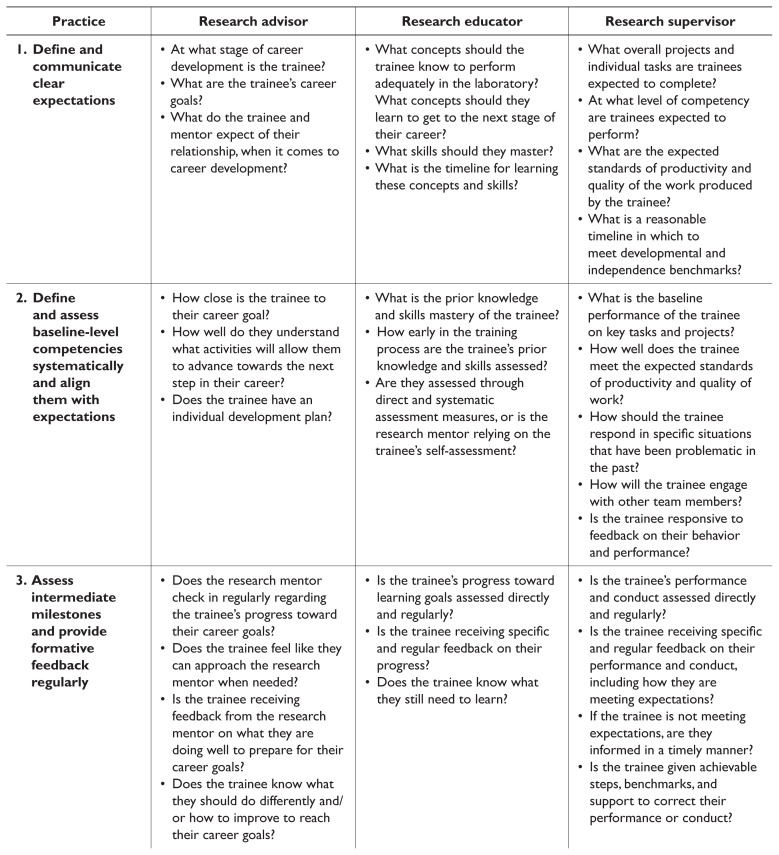| 1. Define and communicate clear expectations |
At what stage of career development is the trainee? What are the trainee’s career goals? What do the trainee and mentor expect of their relationship, when it comes to career development?
|
What concepts should the trainee know to perform adequately in the laboratory? What concepts should they learn to get to the next stage of their career? What skills should they master? What is the timeline for learning these concepts and skills?
|
What overall projects and individual tasks are trainees expected to complete? At what level of competency are trainees expected to perform? What are the expected standards of productivity and quality of the work produced by the trainee? What is a reasonable timeline in which to meet developmental and independence benchmarks?
|
| 2. Define and assess baseline-level competencies systematically and align them with expectations |
How close is the trainee to their career goal? How well do they understand what activities will allow them to advance towards the next step in their career? Does the trainee have an individual development plan?
|
What is the prior knowledge and skills mastery of the trainee? How early in the training process are the trainee’s prior knowledge and skills assessed? Are they assessed through direct and systematic assessment measures, or is the research mentor relying on the trainee’s self-assessment?
|
What is the baseline performance of the trainee on key tasks and projects? How well does the trainee meet the expected standards of productivity and quality of work? How should the trainee respond in specific situations that have been problematic in the past? How will the trainee engage with other team members? Is the trainee responsive to feedback on their behavior and performance?
|
| 3. Assess intermediate milestones and provide formative feedback regularly |
Does the research mentor check in regularly regarding the trainee’s progress toward their career goals? Does the trainee feel like they can approach the research mentor when needed? Is the trainee receiving feedback from the research mentor on what they are doing well to prepare for their career goals? Does the trainee know what they should do differently and/or how to improve to reach their career goals?
|
Is the trainee’s progress toward learning goals assessed directly and regularly? Is the trainee receiving specific and regular feedback on their progress? Does the trainee know what they still need to learn?
|
Is the trainee’s performance and conduct assessed directly and regularly? Is the trainee receiving specific and regular feedback on their performance and conduct, including how they are meeting expectations? If the trainee is not meeting expectations, are they informed in a timely manner? Is the trainee given achievable steps, benchmarks, and support to correct their performance or conduct?
|
| 4. Set transparent consequences and rewards for attainment of outcomes |
|
Is overall learning in a laboratory environment evaluated using transparent, systematic evaluation tools (e.g., grading rubrics)? Do trainees know when they have succeeded or failed at achieving the learning goals established for them? Is the trainee provided with a clear explanation of what will happen if they do not meet these goals?
|
Are the decision criteria for rewards and consequences transparent, systematic, and fair (e.g., authorship position, permission for travel to conferences, assignment of projects, support for fellowship and grant proposals)?
|
| 5. Provide access to appropriate resources for success |
Does the research mentor provide psycho-emotional support to the trainee? Does the research mentor provide the trainee access to their network? Does the research mentor advocate for the trainee and provide sponsorship when the trainee needs it?
|
Based on the assessment of prior knowledge and skills, what is the expected learning curve of the trainee? What is the training plan and its timeline for the trainee? Is the trainee being taught using evidence-based teaching strategies? Is the trainee provided with the types of resources that meet their needs as learners?
|
Does the research mentor support the needs of the trainee by providing access to resources in a timely manner, including information, collaborators, mentors, experts, supplies, and equipment? Does the supervisor take into account the professional needs of diverse populations of trainees, some of which may be impacted by the personal characteristics of the trainee?
|
| 6. Define, communicate, and address conflicts around culture, values, and behavioral expectations |
What are the values of the trainee? What are the values of the research mentor? Which of these values are shared with the trainee? Can the research mentor and trainee accommodate differences? If so, how?
|
What is the culture of teaching and learning in the laboratory? What are the expectations when it comes to self-directed learning? How is the trainee expected to identify and fill their knowledge and skills gaps? How are differences (e.g., cultural differences) accounted for in the education of new trainees?
|
What are the behavioral and conduct expectations in the lab? What values are being modeled by the research mentor and the other team members? What rules must be enforced to maintain the intended lab culture? How are differences managed in the laboratory culture? What are the consequences for poor or inappropriate conduct?
|
| 7. Define transparent and objective eligibility criteria that align with the requirements of the experience |
Can the trainee’s needs and goals be met by the research mentor’s skills, knowledge, resources, and/or network? Is the trainee at the right level for the mentorship offered by the research mentor?
|
What are the knowledge and skills requirements for the position? Is the assessment of prior knowledge and skills conducted in a systematic and direct manner, or is it based solely on indirect measures (e.g., prestige of the institution, colleague’s recommendation, or grade in a class)?
|
|

